If you decided to read this article, chances are that you have tried using homemade remedies to treat a certain skin concern.
Were you surprised when it didn’t work for you, or perhaps even aggravated your concerns even some beauty guru swore it did miracles for their skin?
Have you wondered if you may be doing something wrong while mixing the recipe of a “perfect” homemade mask that should give you glowing skin?
And lastly, have you ever experienced a horrible burning sensation during a DIY gone wrong?
You are not the only one.
Think of all the time and energy lost while reading countless articles on homemade ingredients, recipes, and cures for your skin that have resulted in absolutely zero positive outcomes.
Again, you are not the only person that’s being deceived, lied to and made to believe homemade ingredients can make up for an excellent face mask or even better moisturizer than the one from a professional brand.
That an ingredient from the fridge or spice from your kitchen cabinet is the cure for all things skin-related, and will ultimately give you the glowiest skin ever, and that everyone will compliment and ask for your skincare routine.
If you can totally relate to the truth of my words, continue reading this article to learn more about these 5 popular DIY skincare myths, why there are dangerous and why they must be avoided.
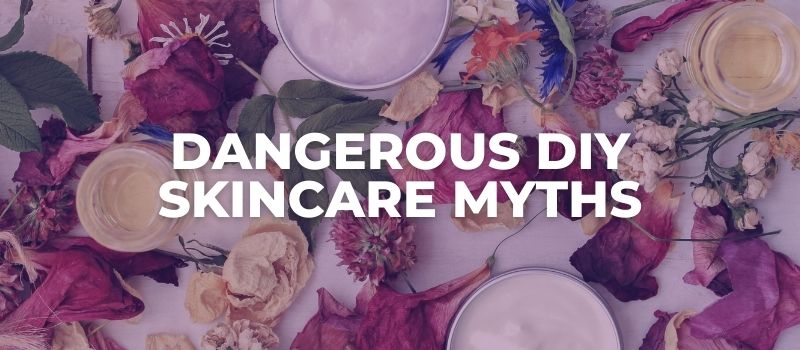
Myth #1: Natural Products Are Safer for The Skin
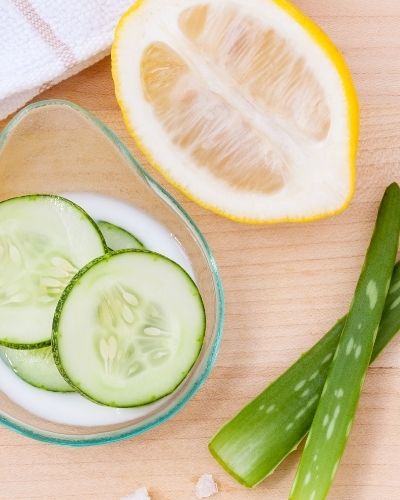
Truth: Natural products can have unsafe pH levels that may cause dryness, irritation, and burns on the skin.
Your skin is your largest organ and it is designed to keep dirt, bacteria, pollution, grime, makeup, etc out and protect your internal organs from infections.
Its ability to protect your skin from these factors is affected by its pH level. The pH level of the skin refers to how acidic or alkaline it is.
On a scale of 1-14, 1 is the most acidic and 14 the most alkaline, while 7 is considered a neutral reading. While you may think that neutral is the best for healthy skin, just because neutral sounds good, you are wrong.
Your skin has a thin, protective layer on its surface, referred to as the acid mantle.
This acid mantle is made up of sebum (oil produced by our sebaceous glands), which mixes with lactic and amino acids from sweat.
Together they create the skin’s pH, which stands somewhere between 4.6 – 6.2 and this means that the pH of healthy skin is slightly acidic.
Many factors can interfere with the delicate balance of the skin’s acid mantle. Everything that comes in contact with our skin such as products, air, water, sun, pollution, smoking can contribute to the disruption of the acid mantle.
What does this mean?
This means that everything, absolutely everything that you put on your skin lower or higher in pH, can contribute to the disruption of the acid mantle and therefore cause various skin conditions.
On the other hand, the pH of your stomach is somewhere between 1.5 – 3.5, which clearly explains that ingredients from the kitchen that typically have low pH are intended to be in your stomach, not on your face.
Myth # 2: Apple Cider Vinegar Is a Natural Acne Remedy
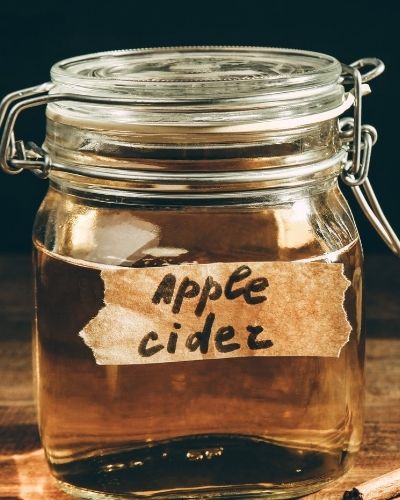
Truth: Apple cider vinegar can cause skin irritation and burns due to its high acidity.
What happens when someone who lacks the knowledge of how the skin functions sit down behind a computer?
– They write an article about how apple cider vinegar is the best homemade ingredient to treat your acne.
Apple cider vinegar has been around for quite some time, and I admit to even trying it out on my fragile, acneic, and inflamed skin in combination with clay.
This ingredient is widely promoted on the Internet as a natural chemical exfoliant that will remove the build-up of dead skin cells, bacteria, pollution, dirt, and *coughs* several skin layers.
All while unclogging your pores and penetrating deeper into the skin to regulate sebum production.
Right off the bat, I will tell you that this is a very dangerous thing to say about a burning acid in a bottle. Ok?
By combining these claims with a price of $3 for a 200ml bottle, an online beauty guru will have tons of people swarming on their website, reading their article on how to get clear skin with apple cider vinegar which (not surprisingly) will result in a recipe for a total disaster.
The most important thing you should know about apple cider vinegar is that it is used as salad seasoning and has a pH of 2.78.
This is incredibly low and extremely dangerous to be anywhere near your skin at any given situation but you should specifically stay away from it if you suffer from inflammation and acne.
And I have an interesting story to share from my own personal experience with the most famous recipe for clear skin on the Internet – apple cider vinegar and Aztec healing clay.
Due to my lack of knowledge of how the skin functions and after reading countless articles on how the best remedy for acne is this little mixture, I decided to give it a shot.
I was desperate because, by this time, it’s been too long since my mild, puberty pimples turned into painful cysts and it was getting to the point where I was too ashamed of even going out of the house to buy groceries.
So I ordered the Aztec Clay Mask from Amazon, specifically determined to give it a shot by mixing it with apple cider vinegar.
So what happened was that I barely sat with this mixture on my face for two whole minutes.
Two minutes was all it took for this face mask to leave me with an extreme burning sensation and lingering redness for several hours after washing it off my face.
After doing some research, I found out that there have been reports of diluted apple cider helping with acne when applied to the skin as a toner, but there is not enough evidence or strong research studies to support this.
Until there is a piece of sustainable evidence that confirms it is safe to be used as an acne treatment on the skin, apple cider vinegar should never be considered a treatment of choice.
Here’s my full article on Why You Shouldn’t Use Apple Cider Vinegar On Your Face.
Myth #3: Coconut Oil is The Best Natural Moisturizer for Dry Skin
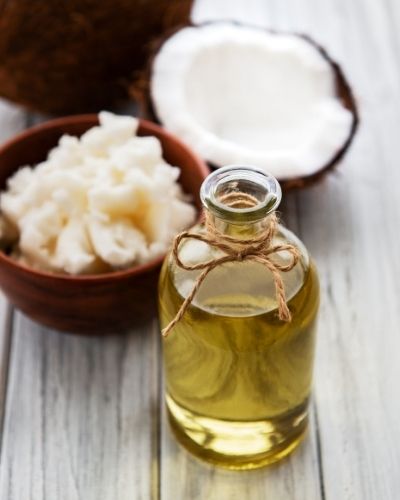
Truth: Coconut oil doesn’t replenish hydration across the epidermal layers. Instead, it creates an occlusive layer on the skin’s surface that can potentially trap dirt and bacteria and increase the risk of infections and irritation.
One term that constantly seems to be popping up whenever you hit the search button for natural remedies for dry skin is the word “hydration”.
Using homemade ingredients in order to keep your skin “hydrated” is another delicious myth beauty gurus and online skin experts are feeding you.
But there is one more thing.
Have you noticed how nearly every recipe you find be it for how to make your own moisturizer or a homemade face mask for dry skin, inevitably has coconut oil as an ingredient in the mixture?
Well, I have.
Coconut oil in the skincare community is considered a miracle ingredient for all skin-related things.
This is one ingredient you rarely hear a bad word about and several studies have shown that coconut oil is beneficial for skin health.
Besides smelling amazing, it also moisturizes, heals, and pretty much lives up to the hype.
But let’s get to the root of science here.
Coconut oil is occlusive. This means it creates a barrier that traps moisture in the skin. You might be thinking where am I getting with this?
There is one huge flaw in this claim and I am about to point it out.
Your skin receives nutrients, oxygen, and “hydration” from inside, not outside. Your skin reaps the benefits of having a great diet and a good water intake in order to remain hydrated because these nutrients travel through your blood.
Your blood gives nutrients and oxygen to your skin cells so they can reproduce and grow.
Since your skin is made entirely out of cells, you should focus on improving your diet and increasing your water intake to reap the benefits.
What coconut oil is supposed to do is to create a barrier and prevent the moisture from evaporating from the surface of the skin, but does it really help when there is nothing from the inside that can escape?
The answer is clear. No.
Coconut oil will comfortably sit on your face and will not hydrate or moisturize or prevent moisture loss because your skin lacks hydration from the inside, not the outside.
Besides this, coconut oil is highly comedogenic, which means that it will clog your pores. It has been rated 4 out of 5 on the comedogenic scale, and it is definitely NOT a good idea to be turning to coconut oil to solve your skin concerns.
Do you know what’s the main reason for acne formation? Clogged pores.
You may blame it on the hormones or whatever lie you’ve been fed by the online skincare community that clearly doesn’t know any better, but it all comes down to clogged pores.
Do you know what’s the main reason for dry skin? Lack of moisture and lack of oil. Not from the outside, but from the inside.
We use moisturizers to seal the barrier and prevent moisture from evaporating through the skin surface. Not coconut oil to “hydrate” our dry skin.
Here’s my full article on Why You Shouldn’t Use Coconut Oil On Your Face.
Myth #4: Baking Soda Can Remove Blackheads
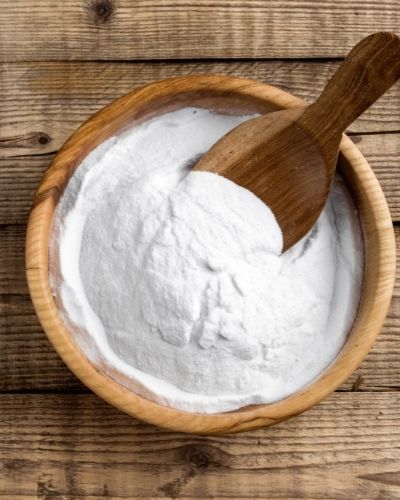
Truth: Baking soda has a high pH that can disrupt the skin’s natural barrier, leading to dryness and irritation.
Coming to this one I have only one thing to say: Whenever I think of applying baking soda on my face it makes my hair stand on end.
Have I seen it on Pinterest? Probably a million times by now.
Do I want to comment every time I see someone explaining in great detail how baking soda is the best way to remove blackheads at home?
I don’t even know how I stop myself from commenting on these posts every single time.
Baking soda is championed as the “end-all skin concerns” by the natural beauty movement or whatever they call themselves.
From using it to wash your hair, to magically removing blackheads from your skin, soothing but bites and whatnots, you name it – baking soda has the answer.
Baking soda, or sodium bicarbonate (am I the only one that doesn’t like the sound of that?), is commonly used to relieve acidic heartburn and rightfully so because of its whooping high pH of 9.
It is a basic alkaline chemical that helps neutralize acids. Acids. Acids as in neutralizing and disrupting the acid mantle on the surface of your healthy acidic skin.
Washing or exfoliating with sodium bicarbonate can remove your skin’s protective barrier, alter your skin’s pH, disrupt the good bacteria that live on the surface of your skin, and leave your skin exposed to infections, acne breakouts, inflammation, dryness, and all hell.
Baking soda can severely irritate the skin. It is especially notorious for causing armpit rashes, redness, and burning for some people who use it for a long time as an ingredient that is supposed to banish odor in homemade natural deodorants.
Is it really worth mentioning that you should stop putting yourself at risk from these uncomfortable side effects just because someone told you that a natural deodorant is better?
Using baking soda to wash, exfoliate, and get rid of blackheads isn’t worth the damage you cause to your skin.
Myth #5: Homemade Moisturizers Are Safer
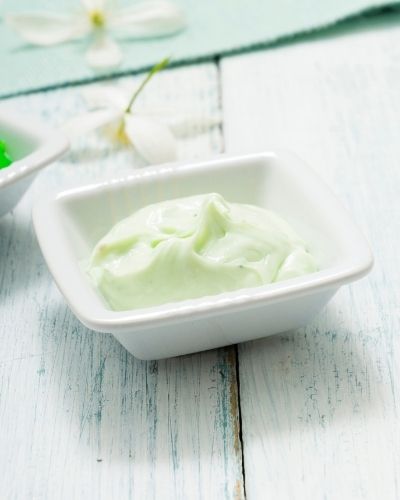
Truth: Homemade moisturizers can actually be more unsafe to use on the skin, as most don’t have an effective preservative system. This increases the risk of contamination, mold, and bacterial growth.
Common homemade moisturizers include using toners, carrier oils, essential oils, and emulsifiers.
Does it sound like too much of a hassle for a simple moisturizer to seal the moisture into your skin?
– That’s because it is.
There are many companies providing us with moisturizers for all skin types, from oily, dry to even the most sensitive skins.
And if you may be thinking that having very sensitive skin that’s reacted to a harsh product in the past is a good enough reason to jump in on cooking a moisturizer in your kitchen, I can tell you that there is an easier solution.
Sensitive skins typically react to artificial fragrances used in moisturizers. So, if a moisturizer has fragrance, you can always avoid that particular product or brand and opt for something more suitable for your skin type.
If you suspect that you are allergic to something, eliminate it. Eliminate bit by bit, product by product until you have an answer for your suspicion.
Or you can simply do an allergy test with the help of your doctor so you can figure out what ingredient is causing your skin to react by becoming irritated.
Let’s tackle the most frequently used ingredients in a homemade moisturizer one by one, shall we?
1. Toners
Toners are used to remove any traces of makeup, oil, and excess dirt that may be lingering on your skin after cleansing. It is also used to correct and balance the pH of your skin after you cleanse.
In other words, a facial toner is a finishing step to your daily cleanse that thoroughly cleans the skin.
So, if you are using a toner after you cleanse, why do you need it in a moisturizer? Well, you don’t.
But you need to mix with something liquid because that something cannot be water cause it will affect the stability of the other ingredients, natural skincare experts use a toner, which isn’t right, and not at all necessary.
2. Carrier Oils
There are two kinds of oils:
- Occlusives – such as coconut oil that’s mentioned above and create a strong barrier on the surface of the skin
- Emollients – that are responsible for softening the skin. But because there are countless of them, how do you know which oil or emollient is good for softening the skin and which one will clog your pores and wreak havoc on your face? You don’t until you try on your own skin. Since most oils are thick and leaning towards being occlusives, you can never be sure how good or bad your skin can react to it. Yes, someone may be trying to convince you that certain oils they wrote an article about are perfect for your skin. But can you really trust them…with your skin?
3. Essential Oils
Essential oils can be extremely irritating if not diluted or used incorrectly.
While some diluted essential oils such as tea tree and lavender have mild antibacterial and anti-inflammatory properties that can be beneficial for the skin, this practice of applying essential oils on your face to treat skin concerns should generally be avoided.
You need a vast understanding (and a certificate in aromatherapy) before you jump on the crazy wagon and start using essential oils as a treatment of choice for various skin concerns.
4. Emulsifiers
Emulsifiers are additives that help two liquids such as oil and water mix together.
For example, oil and water repel each other and the oil always remains floating on water when put together in a glass.
Adding an emulsifier helps the two liquids mix together.
Common emulsifiers in cosmetics are polysorbates, laureth-4, potassium cetyl sulfate, and glyceryl monostearate and this helps to keep unlike ingredients like oil and water together and can also be useful for prolonged topical delivery.
And lastly, there are several questions you should ask yourself if you may be thinking it’s time for you to cook up some nice moisturizer in your kitchen:
- How do you know how much of something should you mix with the other ingredients?
- Does it come by instinct?
- Does it come with a manual?
- Do you see and can tell when’s enough?
- Who researched, studied and lastly approved this recipe?
- Was it an expert in their field or a bored beauty blogger?
Something You Should Know About DIY Skincare…
As an esthetician, I have had the immense pleasure of working with many skincare brands that have helped me in my time of struggles with acne and problematic skin, and I now gladly recommend them to my clients.
I am naturally experimental when it comes to skincare products and something I love doing is trying out different products on my face that are not necessarily always adequate for my skin type.
I do this because I feel it is of great importance to know what a product does and how the ingredients react on my skin before I figure out what skin type would benefit from it best.
That is why I recommend each and every product for each and every client with confidence and accuracy.
Unfortunately, before I started studying and becoming an expert in the field, I was often a victim to today’s popular madness and belief that ingredients from your kitchen are the path to healthy, glowing skin.
I had acne and made them worse with homemade treatments. I had inflammation which was further aggravated from putting spices and something that is intended to be a salad seasoning on my face.
I could go on, but I think you got the point: (most) homemade skin remedies are scams!
What I have now are scars that are a good way to heal and a certification to back up my knowledge on how the skin functions and how to successfully tackle various skin concerns.
Helping and encouraging my clients and readers to take good care of their skin is the biggest part of the career I chose and am passionate about.

My name is Simone and I am a certified skin specialist. I created this website to teach my readers how to take great care of their skin and I also like to occasionally share my honest opinions on skincare products I’ve tried. You can learn more about me here.

Wonderful post! I’ve always thought homemade skin remedies are a scam because if they worked, people would cotton on and stop buying expensive skincare products. It was really interesting to hear a breakdown of the science behind each “natural remedy” and proof of why they don’t work and can be harmful to your skin. I tried out a DIY face mask before and it didn’t do anything at all. It was bad.I’m lucky that my skin isn’t sensitive else I think it would’ve been a disaster! Thank you for educating and sharing, I’ve learned a lot x
Thank you for your comment, Sarah.
I am very happy you enjoyed reading my post and found it interesting and educational.
Unfortunately, the problem with homemade remedies is that they are often the cheapest option available so it is incredibly easy for lies to be spread on the internet about their “amazing skin benefits” when in reality we should just follow a simple logic that food is intended to be in our stomach, not on our face.